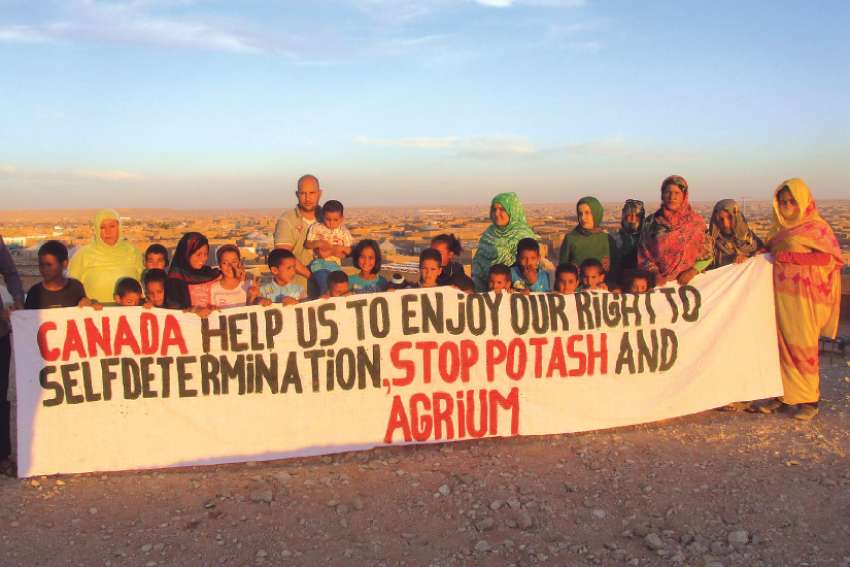Canadian-owned fertilizer giant Nutrien — created by a 2017 merger of Saskatoon-based Potash Corp. and Calgary-based Agrium Inc. — will cease all potash shipments from occupied and disputed Western Sahara territory before Jan. 1, 2019.
“It’s not our place as Canadians to go in and tell other countries how to live or what to do,” said Sisters of Mercy of Newfoundland superior Sr. Elizabeth Davis. “It certainly is our place as Canadians — if we are living or working or present in other countries — to act with justice and to act ethically.”
The Sisters of Mercy is a congregation of about 75 women which ministers in Canada and in Peru, with a focus on alleviating injustice and serving the poor and oppressed, especially women.
Davis stresses the intervention by her congregation was not the only factor, or perhaps even the major one, in the Nutrient decision. But others have expressed admiration for how the sisters galvanized support for their cause.
In 2016 they led shareholder revolts at the annual general meetings of Potash Corp. and Agrium Inc. At the Potash meeting, the sisters rallied votes representing 31.6 per cent of outstanding shares in favour of a motion calling for an independent, public assessment of human rights implications of phosphate mining in the Western Sahara.
A year later Agrium and Potash merged to form Nutrien, becoming the world’s largest producer of potash and the second largest producer of nitrogen fertilizer.
“There’s a bit of a myth of this little religious community from Newfoundland and Labrador trying to stand up to two giant multinational corporations,” said Davis. “But once we became members of SHARE we were no longer a little religious community. Now you are talking about millions and millions of dollars being invested by many, many organizations that shared similar values.”
SHARE is a Canadian organization that encourages small investors to collaborate and create a louder voice to advocate for responsible investment and ethical business practices in Canada and abroad. While unions largely fund the organization, SHARE takes much of its inspiration from religious sisters who began asking questions and proposing motions at corporate general meetings more than 40 years ago.
“They’ve been the ones who really advanced this, brought it to the table, showed how it could be done,” said executive director Kevin Thomas. “Only in recent years has the mainstream caught up with them. The amazing thing about it is they’re still leading.
“The real wins we’ve been seeing, a lot of them have come from the actions of just a small group of sisters, being persistent and doing what they do — which is, take on the issues of the world with a moral force we don’t see often from others.”
Nutrien, however, claims its break with the Moroccan company OCP Western Sahara was a business decision unrelated to a human rights review it undertook at the urging of the Sisters of Mercy.
“For us it was mainly a business decision about how we were converting our phosphate facilities in Redwater (Alberta) and Geismar (Louisiana),” Nutrien spokesperson Will Tigley told The Catholic Register. “We don’t really need to rely on imported phosphate rock anymore. So we made the decision to stop sourcing it from the Western Sahara-Morocco area.”
Tigley says independent reviews of the relationship between OCP Western Sahara and Agrium and Potash concluded they were not contributors to a military standoff between the Polisario Front and the Morrocan armed forces which has left thousands of Sahrawis living in five refugee camps on the border of the occupied territory.
Davis agrees business considerations were “part of the reason” for Nutrien’s decision, “but I hope as well concern for people and the rights of these people in the Western Sahara was part of the decision-making on their part.”
“I have no doubt it (the Sisters of Mercy shareholder motions) wasn’t the deciding factor. But I do hope that it did sharpen the consciences of the leaders in both organizations.”
The Western Sahara holds about 70 per cent of the world’s known reserves of phosphate, the most essential ingredient in most fertilizers. Tigley stressed Nutrien’s predecessors were listening when the sisters talked to them about doing business in occupied territory under military rule.
“We will always listen to our stakeholders,” he said. “But we have a broad range of stakeholders that we listen to. In the end, we have to kind of manage what is best for our business and what we need to do in order to operate.”
Davis has no complaints about Nutrien making sound financial and business decisions. The Sisters of Mercy rely on investments in Nutrien and other companies to fund their work and assure their mission into the future.
“What we were pleading with both Agrium and Potash to do was to be ethical, to be responsive, to be caring for the people with whom they were working,” Davis said.
Last year an OCP shipment bound for New Zealand was seized in South Africa on the grounds the potash was the product of an illegal occupation. After that, the business case against using Western Sahara potash may have sharpened, said Thomas.


